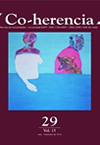La solución de Wittgenstein al problema del "concepto caballo", o de cómo hablar acerca de la estructura del lenguaje según el Tractatus
##plugins.themes.bootstrap3.article.main##
Keywords
Resumo
El artículo propone interpretar la distinción que ofrece Wittgenstein en el Tractatus entre conceptos ordinarios y conceptos formales como una respuesta a las dificultades que se originan en la distinción fregeana entre concepto y objeto, a las cuales la tradición se ha referido como las dificultades del “concepto caballo”. Se mostrará que las expresiones contradictorias y paradójicas que surgen tanto del ataque a dicha distinción (v. g. “el concepto caballo es un objeto”), como de su defensa (v. g. “el concepto caballo no es un concepto”), tienen su origen en la pretensión ilegítima de describir o caracterizar la estructura lógica de la proposición usando para ello otras proposiciones. La distinción entre conceptos ordinarios y formales permite aclarar, primero, en qué sentido esas expresiones son absurdos; segundo, que la distinción entre concepto y objeto solo puede reconocerse en el simbolismo por las características de los signos, pero no puede constituir objeto de descripción.
Downloads
Referências
Dean, K. (2007). The Concept “Horse” Paradox and Wittgensteinian Conceptual Investigations: A Prolegomenon to Philosophical Investigations. Farnham: Ashgate Publishing Ltd.
Engelmann, M. (2013). Wittgenstein’s Philosophical Development: Phenomenology, Grammar, Method, and the Anthropological View. New York: Palgrave Macmillan.
Frege, G. (1972 [1879]). Conceptografía (Begriffsschritt, eine der arithmetischen nachgebildete Formelsprache des reinenDenkens, H. Padilla, Trad.). México: Universidad Autónoma de México.
Frege, G. (1974 [1892]). Escritos lógico semánticos (C. R. Luis y C. Pereda, Tr a d s .). M a d r i d: Té c n o s .
Hamlyn, D. (1959). Categories, Formal Concepts and Metaphysics. Philosophy, 34(129), 111-124. doi: htt ps://doi.org/10.1017/S0 03181910 0 047458
Hacker, P. (2001). Wittgenstein: Connections and Controversies. Oxford: Clarendon Press.
Ishiguro, H. (1969). Use and Reference of Names. In P. Winch (Ed.), Studies in the Philosophy of Wittgenstein (pp. 20-50). London: Routledge.
Kenny, A. (1995). Frege: An Introduction to the Founder of Modern Analytic Philosophy. London: Blackwell Publishers
Kienzler, W. (2011). Reading the Tractatus from the Beginning: How to say everything clearly in three words (Jena, 2008, slightly revised version July 2011). Recuperado de https://bit.ly/2lf7dxm
Koethe, J. (1996). The continuity of Wittgenstein’s thought. Ithaca: Cornell University Press.
Kuusela, O. (2012). Carnap and the Tr a c t a t u s’ philosophy of logic. Journal for the History of Analytical Philosophy, 1(3), 1-25. doi: https://doi.org/10.4148/jhap.v1i3.1334
Kuusela, O. (2014). The Method of Language-Games as a Method of Logic. Philosophical Topics, 42(2), 129-160. Recuperado de https://bit.ly/2yhaJ3u
Linsky, L. (1992). The Unity of the Proposition. Journal of the History of Philosophy, 30(2), 243-273. Recuperado de https://bit.ly/2LZ1zeb
McGinn, M. (2001). Saying and Showing and the Continuity of Wittgenstein’s Thought. The Harvard Review of Philosophy, (ix), 24-36. Recuperado de https://bit.ly/2JTX8Aq
McGinn, M. (2006). Elucidating the Tractatus: Wittgenstein’s Early Philosophy of Logic and Language. Oxford: Oxford University Press.
McGinn, M. (2009). Wittgenstein and internal relations. European Journal of Philosophy, 18, 495-509. doi: https://doi.org/10.1111/j.1468-0378.20 09.0 0359.x
Mota, S. (2015). Wittgenstein en torno a los conceptos. Análisis. Revista de Investigación filosófica, 2, 195-219. doi: https://doi.org/10.26754/ojs_a r i f/a.r i f.201511119
Mota, S. (2018). ¿Son los conceptos formales (o lógicos) categorías ontológicas? Tópicos. Revista de Filosofía, 54, 301-331. doi: http://dx.doi.org /10.21555/top.v0i54.905
Phillips, D. (2007). Complete analysis and clarificatory analysis in Wittgenstein’s Tr a c t a t u s. In M. Beaney (Ed.), The Analytic Turn, Analysis in Early Analytic Philosophy and Phenomenology (pp. 164-177). New York: Routledge.
Russell, B. (2010 [1903]). Principles of Mathematics. London: Routledge Clasics.
Wittgenstein, L. (1979). Cartas a Russell, Keynes y Moore. Madrid: Taurus.
Wittgenstein, L. (2009). Diarios secretos. Madrid: Alianza.
Wittgenstein, L. (2009 [1922]). Tractatus Logico-Philosophicus (J. Muñoz Veiga e I. Reguera Pérez, Trads.). Madrid: Gredos.




